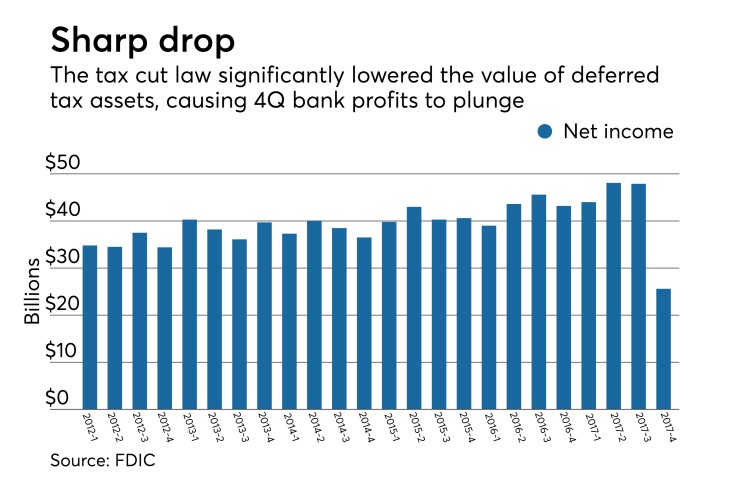WASHINGTON — Bank earnings fell nearly 41% in the fourth quarter from a year earlier, largely because of a one-time hit from the new tax reform law, the Federal Deposit Insurance Corp. said Tuesday in the Quarterly Banking Profile.
Banks reported net income of $25.5 billion, a $17.7 billion drop from the fourth quarter of 2017. The decline was attributed to lower values of deferred tax assets thanks to the cut in the corporate tax rate in the reform bill passed late last year. The repatriation of income from foreign subsidiaries also had a negative effect on earnings.
Were it not for the one-time hit related to the tax bill, bank earnings would have been down a mere 2.3% from a year earlier. The smaller drop in earnings was partly due to an increase in noninterest expenses and loan-loss provisions.

“Despite the decline in net income, the banking industry continued to show steady improvement,” FDIC Chairman Martin Gruenberg said in a statement released Tuesday. “Loan balances grew, net interest margins increased, asset quality remained stable, and the number of ‘problem banks’ continued to fall.”
The FDIC’s so-called problem-bank list fell by nine banks to 95, the lowest number since the fourth quarter of 2008.
Banks also continued to see an increase in total loans, to $164.1 billion in the fourth quarter, up 1.7% from the previous quarter. This helped boost net interest income by 8.5% to $129.5 billion in the fourth quarter year over year.
The average net interest margin for banks rose to 3.31% in the quarter, a 15-basis-point increase from a year earlier. The FDIC said it was the highest quarterly net interest margin since late 2012. Community banks, in particular, reported the highest net interest margins, although Gruenberg said “the gap has been narrowing” between large banks and community banks.
However, there were some other hits that banks took to earnings besides the tax reform law. Banks set aside 8.9% more in their loan-loss provisions from a year earlier. Provisions totaled $13.6 billion in the quarter.
"More than one in three (38.9 percent) institutions reported higher loan-loss provisions than in fourth quarter 2016," the agency said.
And banks also charged off $1 billion more in delinquent loans during the fourth quarter. Net charge-offs rose 8.6% from a year earlier, to $13.2 billion.
"This marks a ninth consecutive quarter that net charge-offs increased," the FDIC report said.
Net income for all of 2017 year was down 3.5% to $164.8 billion, largely because of the changes in the tax law. Income would have otherwise been up 7.2% to $183.1 billion, the FDIC said.
Gruenberg once again cautioned banks about “reaching for yield” by investing in higher-risk and longer-term assets because of the prolonged low interest rate environment and competition.
“Going forward, the industry must manage interest rate risk, liquidity risk, and credit risk carefully to continue to grow on a long-run, sustainable path,” he said. “These challenges facing the industry will remain a focus of supervisory attention.”
Gruenberg added that “community banks are particularly vulnerable to interest rate risk” since nearly half their assets will reprice in three or more years.
The American Bankers Association’s economist, James Chessen, said interest rate risk “is always top of mind for banks,” especially since they expect the Federal Reserve Board will raise rates again in March.
“ABA’s Economic Advisory Committee expects at least three rate increases by the Fed this year, something banks are well prepared to manage and have included in their asset and liability management plans,” said Chessen in a statement responding to the FDIC’s quarterly bank earnings report.
The Deposit Insurance Fund rose by $2.2 billion during the quarter and the ratio of insurance reserves to insured deposits rose 2 basis points to 1.3%.





